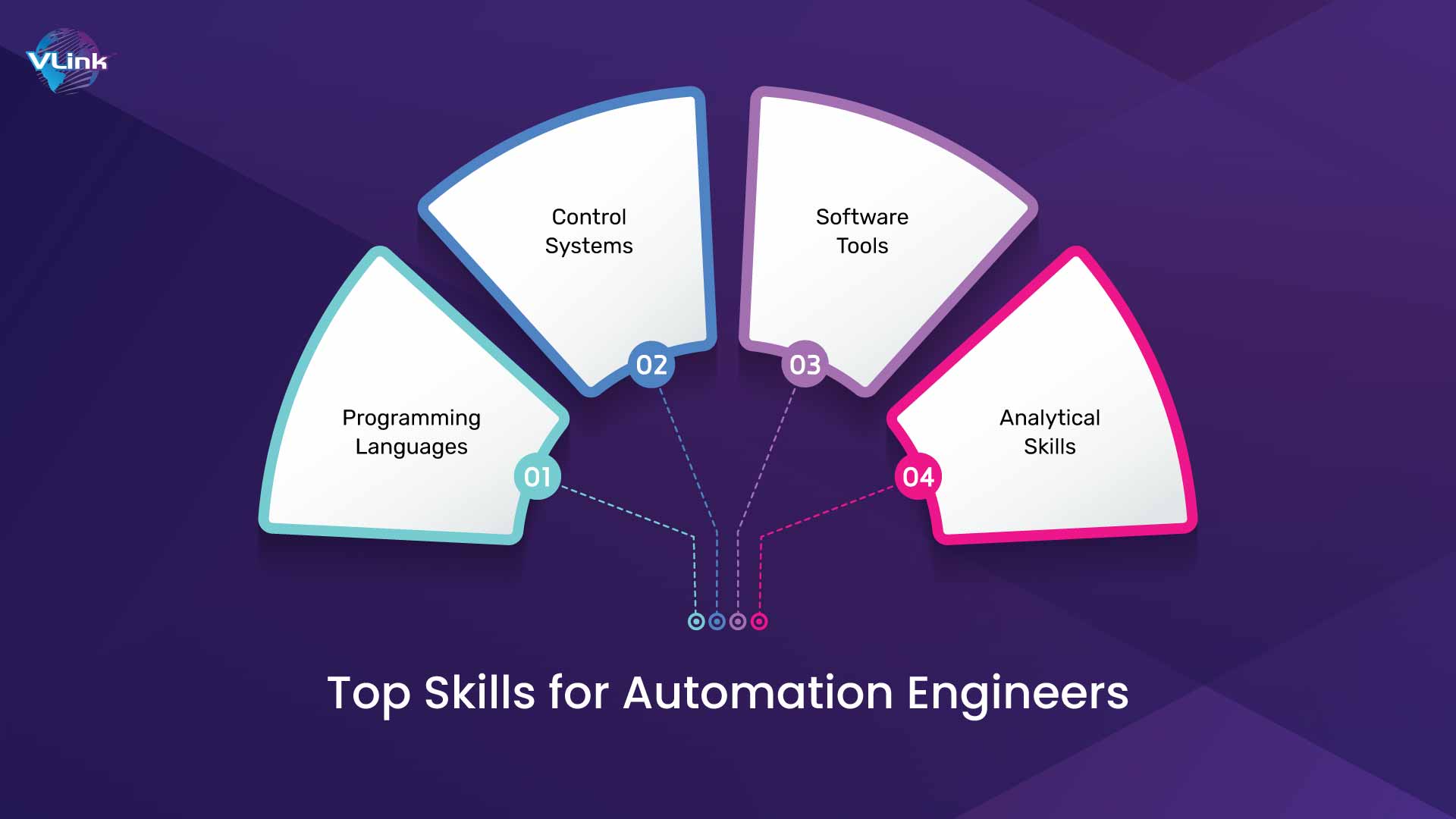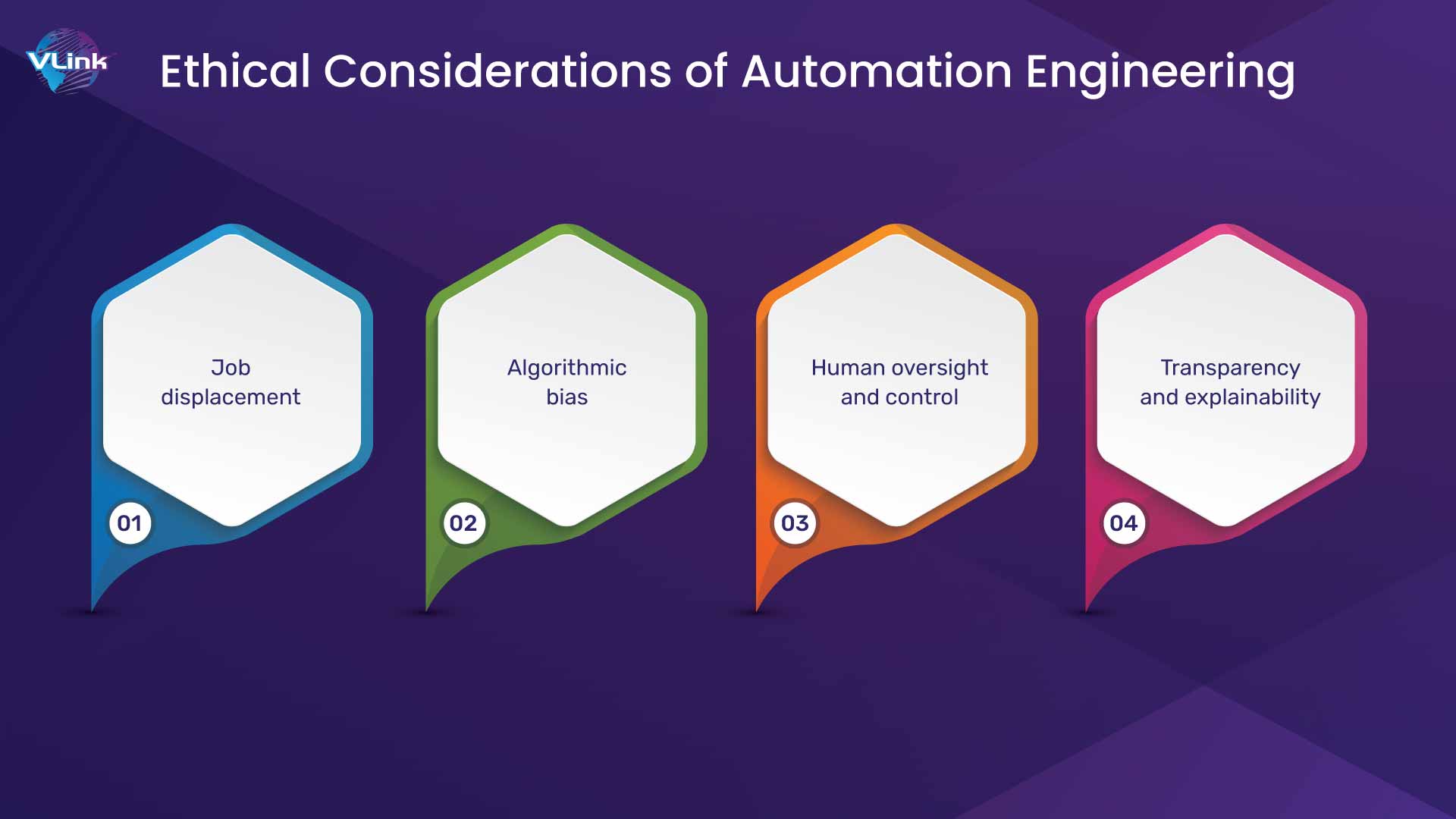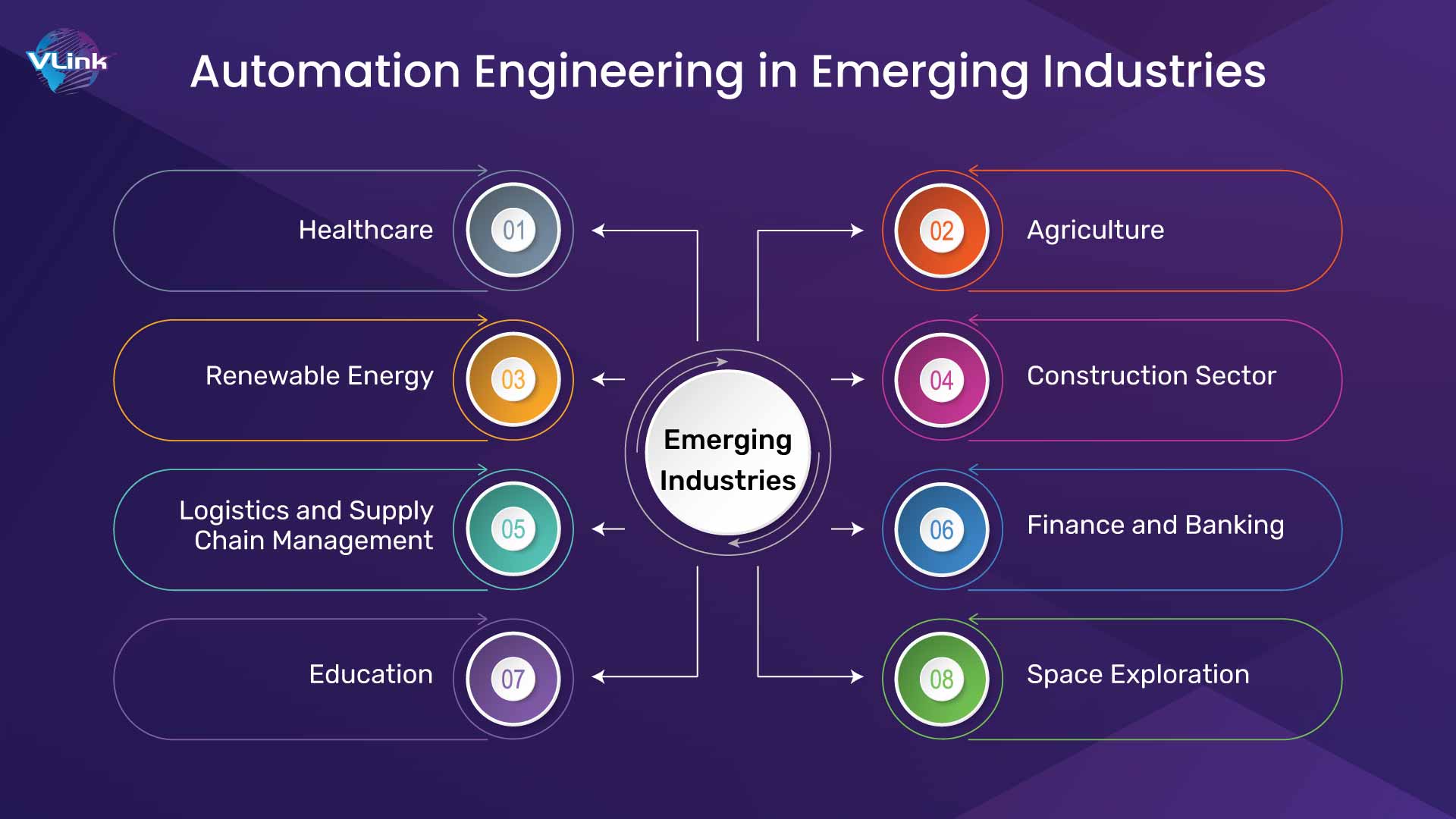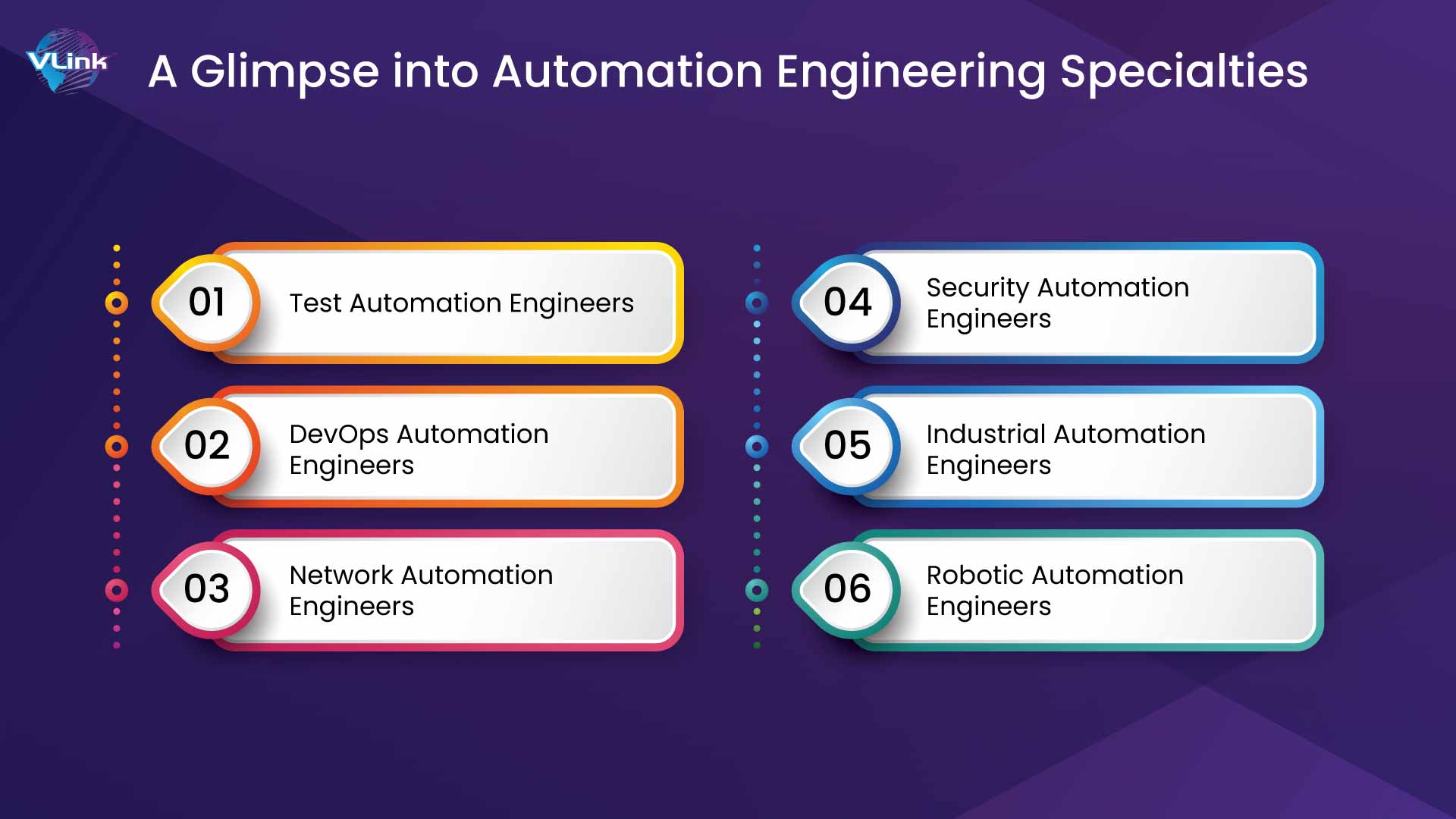The relentless march of technology has fundamentally reshaped every facet of our lives. Businesses across industries constantly look for ways to streamline processes, maximize output, and minimize errors. Automation has emerged as a game-changer in this quest for efficiency, and the skilled professionals who wield this power are the Automation Engineers.
A 2023 McKinsey Global Institute report estimates that by 2030, up to 800 million jobs could be lost to automation, while an additional 375 million could be displaced. This report also highlights the creation of up to 950 million new jobs in the same year. This underscores the crucial role automation will play in the future of work and the increasing demand for professionals who can design, implement, and manage these automated systems.
In this in-depth exploration, we'll delve into the fascinating realm of Automation Engineering, uncovering the secrets behind these architects of efficiency. But before we dive into the wonders they create, let's meet the masterminds behind it all: Automation Engineers. These tech wizards are the architects of efficiency, but what exactly do they do?
Who is an Automation Engineer?
Imagine an orchestra conductor meticulously coordinating various instruments to create a harmonious symphony. An Automation Engineer plays a similar role, but they orchestrate automated systems instead of instruments. These systems can be software-based, involving the creation of scripts and programs to automate tasks, or hardware-based, focusing on automating physical processes through machinery and robotics.
The reach of automation engineering extends far and wide. Here's a glimpse into some of the key domains where automation engineers work their magic:
- Manufacturing:
Picture an assembly line with robots seamlessly welding parts together or a food processing plant with intricate machinery sorting and packaging products meticulously. Behind these marvels of modern manufacturing stand automation engineers. They design and implement systems that control robots, manage production flows, and ensure stringent quality control measures are met.
- Software Development:
Repetitive testing procedures can be a real drag for developers. Automation engineers come to the rescue! They craft tools and scripts that streamline these tasks, freeing valuable developer time to focus on more complex projects and innovative features.
- IT Operations:
Network management, server maintenance, and data backups – the lifeblood of any organization's IT infrastructure. Automation engineers design solutions that ensure these critical tasks run smoothly, 24/7. This minimizes human intervention and the potential for human error, providing a more robust and reliable IT environment.
- Quality Assurance:
Ensuring software functionality and identifying bugs is paramount in software development. Automation engineers play a vital role in test automation. Hiring Test Automation Engineer helps you design and develop automated test scripts to meticulously test software, identify bugs early in the development cycle, and ensure a high-quality user experience.
- Logistics and Warehousing:
Warehouses are no longer solely human-driven domains. Automation engineers are revolutionizing logistics with automated storage and retrieval systems (AS/RS). These pick-and-place robots handle heavy objects with agility and conveyor belts that efficiently move goods throughout the facility.
Top Skills for Automation Engineers

The automation engineering world demands a unique blend of technical prowess and problem-solving abilities. Here's a closer look at the essential skills that equip automation engineers for success:
- Programming Languages:
Fluency in programming languages is the foundation for automation engineers. Languages like Python, Java, and C++, as well as scripting languages like JavaScript and PowerShell, are the tools of their trade. These languages allow them to create scripts, programs, and control systems that automate tasks.
- Control Systems:
Industrial automation engineers must understand PLC (Programmable Logic Controllers) and SCADA (Supervisory Control and Data Acquisition) systems. PLCs are the brains of industrial automation, controlling machinery and processes, while SCADA systems provide a visual interface to monitor and manage these processes.
- Software Tools:
The automation engineer's toolbox is brimming with specialized software. Familiarity with automation frameworks like Selenium for web automation and tools like Jenkins for continuous integration/continuous delivery (CI/CD) is highly valuable. These tools streamline the development, testing, and deployment of automation solutions.
- Analytical Skills:
At its core, automation is all about identifying repetitive tasks and designing efficient solutions. Strong analytical skills are key to understanding complex processes, pinpointing bottlenecks, and devising creative automation strategies.
Essential Soft Skills for Test Automation Engineers
While technical expertise is paramount, automation engineers with strong, soft skills will stand out in the competitive job market. Here are some key soft skills that will enhance your success:
- Critical Thinking and Problem-Solving: Automation involves identifying problems and devising creative solutions. Strong critical thinking skills allow you to analyze complex situations, identify root causes, and develop effective automation strategies.
- Adaptability and Continuous Learning: The field of automation is constantly evolving. Automation engineers must be adaptable and embrace a continuous learning mindset to stay up-to-date with the latest technologies and trends.
- Communication and Collaboration: Effective communication is crucial for collaborating with various teams, explaining technical concepts to non-technical stakeholders, and documenting automation solutions.
- Time Management and Organization: Automation projects often involve multiple tasks and deadlines. Strong time management and organizational skills ensure efficient workflow and successful project completion.
Test Automation Engineer Roadmap
Automation engineering offers a promising career path with excellent growth potential. Here's a roadmap to consider as you embark on your journey:
- Education:
A solid educational foundation is crucial for aspiring automation engineers. A bachelor's degree in computer science, electrical engineering, or mechanical engineering provides a strong foundation in core technical concepts. Additionally, consider specializing in robotics, control systems, or automation engineering if your program offers such options.
- Certifications:
While not mandatory, certifications can significantly enhance your profile and demonstrate your expertise in specific automation tools and technologies. Popular certifications include Certified Automation Professional (CAP) from the International Institute of Business Analysis (IIBA), Certified Selenium WebDriver Expert (CSWE) from the Automation Guild, and AWS Certified DevOps Engineer – Professional from Amazon Web Services (AWS).
- Entry-Level Roles:
Junior Automation Engineer roles are a great starting point to gain practical experience. In these roles, you'll typically assist senior engineers with script development, system testing, and documentation tasks. This allows you to learn the ropes, understand different automation approaches, and gain valuable insights into various industry applications.
- Mid-Level Roles:
You can progress to Automation Engineer roles as you gain experience and hone your skills. Here, you'll take on more responsibility, independently designing, implementing, and maintaining automation solutions for specific projects or departments. You may also be involved in mentoring junior engineers and providing technical guidance.
- Senior-Level Roles:
Senior Automation Engineers are the leaders of the pack. They spearhead automation projects, manage teams of automation engineers, stay abreast of the latest trends in automation technologies, and define the organization's overall automation strategy. They may also evaluate new automation tools and technologies and make recommendations for implementation.
The demand for skilled automation engineers is translating into a lucrative job market. According to a 2023 report by Indeed, the average base salary for Automation Engineers in the United States is around $109,000 annually. This figure can vary depending on experience, location, industry, and the specific skillset required for the role.
With the increasing adoption of automation across industries, this trend is expected to continue, making automation engineering a highly attractive career path for those seeking financial stability and growth potential.
The Ethical Considerations of Automation Engineering

As automation becomes more sophisticated, ethical considerations come to the forefront. Automation engineers are responsible for ensuring their creations are used responsibly and ethically. Here are some key aspects to consider:
- Job displacement:
Automation can lead to job losses in certain sectors. Automation engineers should be mindful of this potential impact and advocate for retraining programs and reskilling initiatives to help displaced workers transition to new roles.
- Algorithmic bias:
Automation solutions rely on algorithms, which can perpetuate existing biases. Automation engineers need to be aware of potential biases in the data used to train these algorithms and take steps to mitigate them. This might involve using diverse datasets, employing fairness checks, and continuously monitoring the performance of algorithms to identify and address any bias that may creep in.
- Human oversight and control:
Automation should not replace human judgment entirely. Automation engineers should design systems that allow for human oversight and intervention when necessary, particularly in situations with ethical implications. For example, while automated systems can analyze medical data in healthcare, the final diagnosis and treatment decisions should always rest with a qualified medical professional.
- Transparency and explainability:
Complex automation solutions can be opaque. Automation engineers should strive to design transparent and explainable systems, allowing humans to understand how these automated systems make decisions. This can involve providing clear documentation, user interfaces that explain the reasoning behind automated decisions, and the ability to audit the system's performance.
By proactively addressing these ethical considerations, automation engineers can help ensure that automation benefits society and aligns with our human values.
Essential Resources for Test Automation Engineers
The field of test automation engineering is constantly evolving. Continuous learning is essential to stay ahead of the curve and remain competitive in the job market. Here are some valuable resources for test automation engineers:
- Online Courses and Tutorials:
Several online platforms offer courses and tutorials on various automation technologies, programming languages, and automation best practices. Websites like Coursera, Udemy, edX, and Pluralsight are excellent starting points. Look for courses with practical exercises and projects that allow you to apply what you have learned in real-world scenarios.
- Industry Publications and Blogs:
It is crucial to stay informed about the latest trends and developments in automation engineering. Subscribe to industry publications and blogs like The Automation Guild Blog, Robotic Process Automation (RPA) Today, and Control Engineering. These publications feature news, articles, and expert insights on various aspects of automation technology.
- Professional Organizations and Conferences:
Active participation in professional organizations like the Association for Computing Machinery (ACM) or the Institute of Electrical and Electronics Engineers (IEEE) provides access to valuable resources, networking opportunities, and professional development programs. Attending industry conferences and events allows you to learn from experts, explore new technologies, and connect with other automation professionals. These events can be a great way to stay up-to-date on the latest trends and innovations in the field.
In addition to these resources, consider contributing to the knowledge base yourself. Sharing your expertise through blog posts, articles, or even open-source projects can solidify your understanding, enhance your reputation, and establish you as a thought leader in the automation engineering community.
Automation Engineering in Emerging Industries

Automation is no longer confined to traditional industries like manufacturing and IT. As technology advances, automation makes inroads into various emerging sectors, creating exciting new opportunities for automation engineers. Here are a few examples:
- Healthcare: Automation is playing an increasingly important role in healthcare, streamlining administrative tasks, automating data analysis for medical research, and even assisting in robotic surgery.
- Agriculture: Precision agriculture is revolutionizing farming practices. Automation engineers are developing solutions for automated irrigation systems, crop monitoring using drones, and even autonomous farm equipment.
- Renewable Energy: The renewable energy sector embraces automation to optimize energy production and distribution. Automation engineers design solutions for smart grids, automated solar panel cleaning systems, and wind turbine maintenance robots.
- Construction Sector: The construction industry is notorious for inefficiencies and safety hazards. Automation engineers are developing solutions for automated bricklaying robots, construction site drones for monitoring progress and safety, and 3D printing technologies for on-site construction of specific building components.
- Logistics and Supply Chain Management: The ever-growing demand for e-commerce and efficient delivery necessitates streamlined logistics operations. Automation engineers are designing and implementing solutions for automated warehouse robots that handle picking and packing tasks, self-driving delivery vehicles, and intelligent inventory management systems.
- Finance and Banking: Repetitive tasks like data entry, loan processing, and fraud detection can be significantly automated, freeing human resources for more complex financial analysis and customer service. Automation engineers are developing solutions for automated know-your-customer (KYC) verification, algorithmic trading platforms, and AI-powered chatbots for customer service.
- Education: Automation can personalize the learning experience and make education more accessible. Automation engineers are creating solutions for intelligent tutoring systems, automated grading for objective assessments, and virtual reality simulations for immersive learning experiences.
- Space Exploration: The exploration of space is fraught with challenges. Automation engineers are developing solutions for autonomous rovers for planetary exploration, robotic arms for satellite maintenance, and AI-powered systems for spacecraft navigation and decision-making.
These are just a few examples of the vast potential for automation engineers in emerging industries. As these sectors continue to embrace automation, the demand for skilled professionals who can design, implement, and maintain these systems will only increase.
Shaping the Future with Automation Engineering: A Collaborative Endeavor
The future of automation engineering is not a solitary pursuit—it's a collaborative effort. We can harness automation's true potential by fostering open communication and collaboration between automation engineers, developers, IT professionals, and business leaders. This collaborative approach will ensure that automation solutions are efficient, ethical, user-friendly, and aligned with the specific needs of each industry.
Here are some ways to foster collaboration:
- Cross-functional teams: Establish cross-functional teams comprised of automation engineers, developers, and business stakeholders. This will allow for better communication, ensure that automation solutions directly address business needs, and foster a shared understanding of the project goals.
- Clear communication: Effective communication is key. Automation engineers must explain complex technical concepts to non-technical stakeholders and ensure everyone is on the same page. This can involve using clear language, creating visual aids, and actively listening to feedback.
- Standardized practices: Developing and adhering to standardized practices for automation development, testing, and deployment can streamline collaboration and ensure the reliability and maintainability of automation solutions.
The world of automation engineering is brimming with potential. It offers a dynamic and intellectually stimulating environment for those passionate about technology, enjoy a good challenge and thrive in a fast-paced environment. With the right skills, dedication, and a continuous learning mindset, you can become a key player in shaping the future of automation and contributing to a more efficient and innovative world.
A Glimpse into Automation Engineering Specialties

The vast landscape of automation engineering offers diverse specializations, each catering to specific industry needs and technological applications. Here's a brief overview of some popular specializations to help you identify the path that aligns with your interests and skillset:
- Test Automation Engineers: As the name suggests, these engineers focus on automating software testing processes. It can help you design and develop automated test scripts to meticulously test software functionality, identify bugs early in the development cycle, and ensure a high-quality user experience.
- DevOps Automation Engineers: These engineers bridge the gap between development (Dev) and operations (Ops) teams. They leverage automation tools and technologies to streamline the software development lifecycle, automate infrastructure provisioning and configuration, and ensure continuous integration and continuous delivery (CI/CD) of software applications.
- Network Automation Engineers: The network is the backbone of any organization's IT infrastructure. Network automation engineers design and implement automation solutions to manage and optimize network devices, automate network configuration tasks, and troubleshoot network issues efficiently.
- Security Automation Engineers: Cybersecurity threats are ever-evolving. Security automation engineers utilize automation tools and technologies to automate security tasks like vulnerability scanning, intrusion detection, and security incident response. This allows them to detect and respond to security threats faster and more effectively.
- Industrial Automation Engineers: They are the masterminds behind the automation revolution in manufacturing. They design, develop, and implement automated control systems for industrial machinery and processes, ensuring efficient production, improved quality control, and enhanced safety within industrial settings.
- Robotic Automation Engineers: Robotics is rapidly transforming various industries. Robotic automation engineers specialize in designing, programming, and integrating robots with automated systems. They play a crucial role in developing robots for tasks ranging from manufacturing and logistics to healthcare and exploration.
This is by no means an exhaustive list. As automation technology continues to evolve, new specializations are likely to emerge. The key takeaway is to explore different areas, identify what sparks your curiosity, and develop your skillset accordingly.
Hire a Test Automation Engineer From VLink
Finding the right test automation engineer for your needs can be challenging. VLink, a leading provider of IT staffing solutions, can help you navigate this process. We deeply understand the automation engineering landscape and maintain a network of highly skilled, experienced automation professionals.
Here's why VLink is your perfect partner in hiring test automation engineer talent:
- Rigorous Recruitment Process: We meticulously screen candidates through technical assessments and in-depth interviews to ensure they possess the requisite skills and experience for your project.
- Industry Expertise: Our dedicated team comprehensively understands various industries and can match your specific automation needs with the most suitable talent.
- Scalable Solutions: Whether you require a single automation engineer for a short-term project or a dedicated team for ongoing automation initiatives, VLink can provide the perfect staffing solution.
- Cost-Effective Options: We offer flexible engagement models to suit your budget and project requirements.
Contact Us today to discuss your automation engineering needs and discover how we can help you build a high-performing automation team.
The Final Word
Automation engineering is not just about replacing human workers with machines. It's about creating a future where humans and machines work together seamlessly, leveraging the strengths of each to achieve remarkable feats of efficiency and innovation. You can be at the forefront of this transformation as an automation engineer.
Here's why you should consider a career in automation engineering:
- Be a Changemaker: Your work can revolutionize industries, streamline processes, and improve lives. You'll be satisfied knowing your contributions lead to a more efficient and productive world.
- Never Stop Learning: The field of automation is constantly evolving. This ensures a stimulating and intellectually challenging career path where you'll always have new things to learn and explore.
- Lucrative Opportunities: The demand for skilled automation engineers is high and will only increase. This translates to excellent job prospects and competitive salaries.
- A World of Possibilities: Automation engineering opens doors to diverse industries and applications. You can specialize in a specific domain or explore a more generalist approach. The possibilities are truly endless.
If you're passionate about technology, have a problem-solving mindset, and enjoy a good challenge, then automation engineering might be your perfect career path. Take the first step today – explore resources, learn new skills, and prepare to embark on a rewarding journey that shapes the future of automation!
Frequently Asked Questions
If you enjoy problem-solving, tinkering with technology, and automating repetitive tasks, then Automation Engineering could be your calling! This field combines technical expertise with creativity as you design and implement solutions to streamline processes. It also requires strong analytical skills to identify areas for improvement and measure the impact of automation. So, if you're passionate about efficiency and building clever systems, this path might be perfect for you.
This is a common concern, but automation often leads to job transformation rather than elimination. While repetitive tasks are automated, new opportunities arise in designing, maintaining, and overseeing these systems. Automation Engineers are in high demand to bridge this gap, ensuring smooth implementation and adaptation. Additionally, automation frees human workers to focus on higher-level tasks requiring creativity, critical thinking, and interpersonal skills—areas where automation struggles.
Start by developing your technical skills! Learn programming languages like Python or Java, delve into scripting languages like Bash, and familiarize yourself with popular automation tools like Selenium or Ansible. There are plenty of online tutorials and resources available. Look for internships or entry-level positions that allow you to gain practical experience. Network with professionals in the field, attend industry events and showcase your projects on platforms like Github. By demonstrating your passion and initiative, you'll be well on your way to becoming a successful Automation Engineer.
The world of Automation Engineering is vast! Some common domains include:
- Industrial Automation: It involves automating manufacturing processes, robots, and machinery in factories and production lines.
- Software Automation: Here, engineers focus on automating software testing, development workflows, and deployment processes.
- Building Automation: They create smart buildings with automated controls for lighting, HVAC systems, and security.
- Test Automation: These engineers design and develop automated testing systems for hardware, software, and networks.
A four-year engineering degree is a common path, but it's not the only route. A strong background in computer science, IT, or a related field can be a great foundation. Many companies value certifications in specific automation tools and platforms. Additionally, some universities offer bootcamps or online courses focused on Automation Engineering, providing the necessary skills and knowledge to launch your career.















